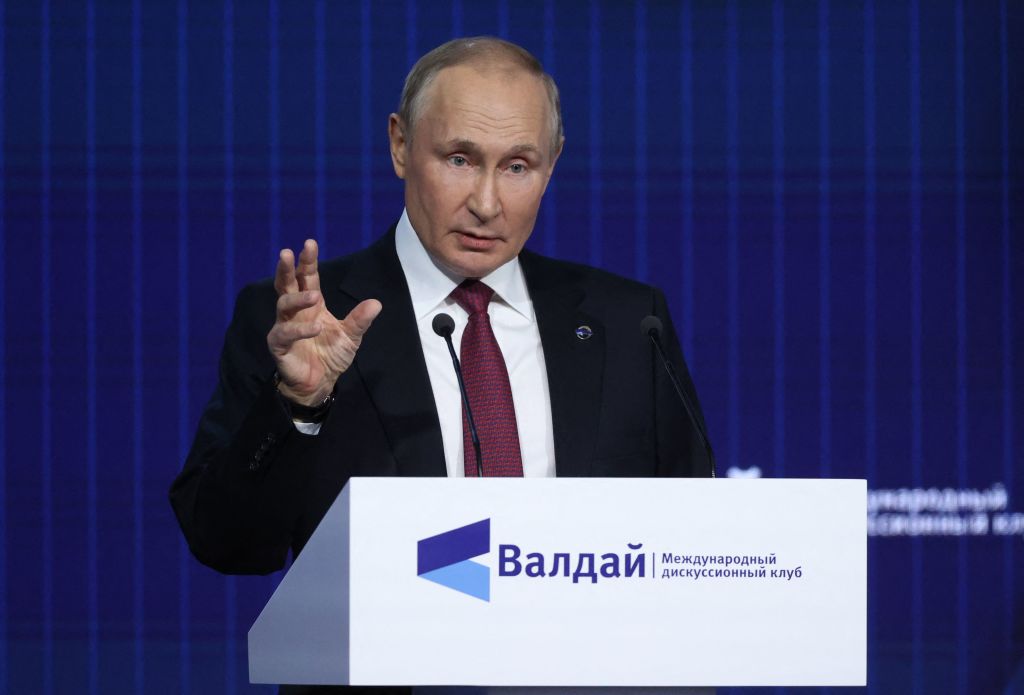If there is one thing we have learnt since Vladimir Putin invaded Ukraine in February, it is that very little he says bears any relation to the truth. For nearly a year, the Russian President has been constructing his own house of mirrors: his rhetoric gives no indication of what is fact or fiction, bluff or candour, hard truth or hot air. Each speech he gives further distorts the reality he presents.
Yesterday, Putin spoke at an event held by the Moscow-based think tank Valdai Discussion Club. The theme of his speech was ‘A post-hegemonic world: Justice and security for everyone’. Whose hegemony does this refer to? That of the West – or ‘our opponents’ as Putin ‘carefully’ called them with a smirk. Who is providing ‘justice and security for everyone’? Why Putin, of course.
The speech gave him the opportunity to further double down on his grievances with the world – it is clear that he considers the source of the problem to be bigger than just Ukraine. Without a hint of irony, he ran through all of the West’s perceived wrongdoings.
With astounding hypocrisy he declared that ‘democracy is the right of any people to choose their own socio-political system’. Alluding to Ukraine (notably he referred to ‘war’, not the ‘special military operation’), he continued that if the West were ‘true democrats, they would support this desire for freedom’ – freedom from Europe, that is, not Russia. But no, instead they ‘bring in boycotts and sanctions and support revolutions’.
It was the West, Putin said, who was in fact responsible for blowing up the Nord Stream pipelines – ‘an extraordinary thing, but there you have it’. This is despite credible evidence suggesting Russian sabotage might have been behind the September explosions.
Somewhat breaking the fourth wall, he exclaimed: ‘Everything that comes from Russia is “at the hand of the Kremlin”. Just look at yourselves. Are we really so all-powerful? This is nonsense! Use your brains, say something more interesting. You can’t leave everything at the door of the Kremlin!’
A key theme of Putin’s speech was Russia’s, and by extension his own, victimhood. We need to treat each other with respect,’ he spat, ‘In a number of regions of [Russia] – I just know this firsthand – people come together to celebrate Christian, Islamic, Buddhist, and Jewish holidays, and do it with pleasure’. His words follow months of reports of heavy, disproportionate conscription, and deaths, from Russia’s poorer, ethnic minority-heavy regions to Ukraine.
By no stretch do Putin’s words mirror reality. He wins when those hearing his untruths get lost in them
Putin repeatedly mentioned respect – he clearly felt he had to get it off his chest. ‘Traditional values are not replicable. They come from a country’s culture and historical experience. Therefore you can’t hold them against someone, it’s important simply to respect them’. The message, then, seems clear: Putin wants respect from the West, and at the moment, he’s not getting it.
He devoted nearly a third of his time on stage to addressing ‘cancel culture’. In a remarkable turn, he compared the West to Nazi Germany: just as the Nazis once burnt books that didn’t align with their world view, so the ‘racist, neo-colonialist’ West was now ‘cancelling’ Dostoevsky and Tchaikovsky.
In the eight months since Russia’s invasion, multiple reports have surfaced of Russian troops burning and destroying Ukrainian books, artwork and sites of cultural significance. This fact didn’t stop Putin declaring that ‘even at the height of the Cold War, it never even occurred to anyone to deny the very existence of culture, art, science of their opponents’. Never mind his assertion, repeated later in the same speech, that Ukraine is an ‘artificial state’, it was Russia who was ‘defending its own right to exist and develop freely’. The West is the one playing a ‘dangerous, bloody and dirty game’.
Putin’s condemnation of cancel culture comes days after news broke that the celebrity TV presenter turned journalist Ksenia Sobchak fled Russia for Lithuania to escape trumped up charges of extortion. Sobchak is the daughter of Putin’s one-time boss, the former mayor of St Petersburg Anatoly Sobchak, and is rumoured to be the Russian President’s goddaughter. Until recently, these ties afforded her a modicum of protection as a relatively outspoken critic of the Kremlin. That even she is no longer safe in Russia points to the degree to which Putin’s intolerance of free speech has grown. As yesterday’s speech proved, he himself, is cancel culture’s most extreme enforcer.
His speeches tend to follow a similar pattern: he gives his listeners a history lesson, rants about concepts of values, culture and nationhood, and attacks his enemies. His speeches strive to address both domestic Russian and international audiences at once. This performance ticked all those boxes.
Notably, yesterday’s speech betrayed his own sense of grandiosity in a way not seen for a while: Putin believes that he alone is capable of taking on the entire West by himself. ‘It will be up to the West to begin a conversation regarding our mutual future, and the sooner the better’. Anyone tempted to interpret these goading words as a sign he is ready for dialogue, though, should think again. Putin could stop his war in Ukraine at any moment, but chooses not to.
Whether Putin truly believes the lies he spouts, only he can say. By no stretch do they mirror reality. Putin wins when those hearing his untruths get lost in them. It is up to us, and indeed the Russian people, to navigate our way through them and expose them for what they are: the warped rantings of a paranoid dictator.







Comments